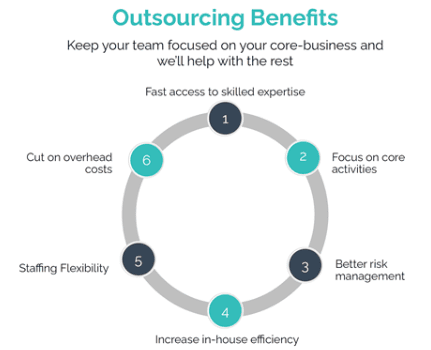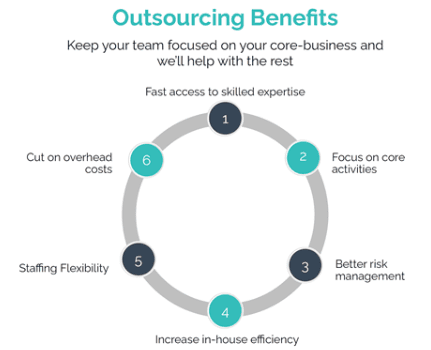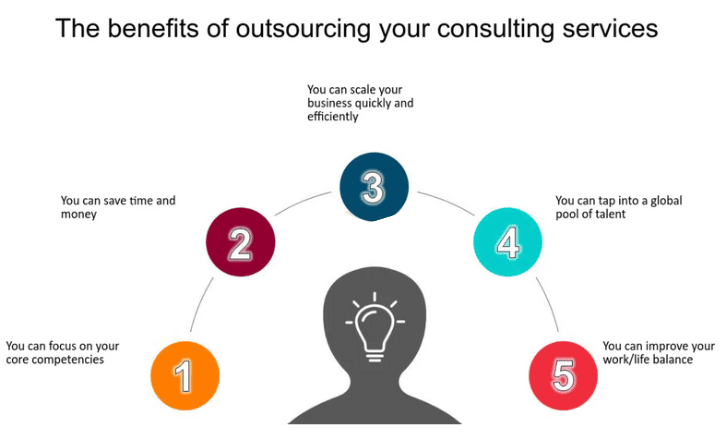The global consulting industry, a titan of expertise and strategic advice, stands at a pivotal juncture. Traditional models, while foundational, are increasingly being augmented and, in some cases, reshaped by the transformative power of strategic outsourcing. For services-focused consultancies in the United States, understanding and adeptly navigating the outsourcing landscape is no longer a peripheral consideration but a core strategic imperative for growth, efficiency, and sustained competitive advantage in an increasingly complex global market.
The Shifting Tides: Why Consultancies Are Increasingly Turning to Outsourcing
Several interconnected pressures and opportunities are compelling US-based consultancies to explore and adopt outsourcing solutions:
- Intensified Competition: The consulting market is crowded, with global players, specialized boutiques, and even freelance consultants vying for client projects. This drives a need for differentiation and cost-effectiveness.
- Client Demands for Value and Speed: Clients expect high-quality deliverables faster and often at more competitive price points. They demand measurable ROI and innovative solutions.
- The War for Talent: Acquiring and retaining top-tier consulting talent, especially in specialized or high-demand areas (like AI, cybersecurity, specific SaaS platforms), is increasingly challenging and expensive in the US market.
- The Need for Scalability: Project pipelines can be unpredictable. Outsourcing offers a way to scale resources up or down quickly without the fixed costs of permanent hires.
- Globalization of Services: Technology has made it easier to collaborate with talent globally, opening up new avenues for service delivery.
- Focus on Core Competencies: Consultancies recognize the need to focus their high-cost, in-house talent on the most strategic, client-facing, and revenue-generating activities.
As reported by sources like Statista on the global outsourcing market and industry analyses from firms like Gartner or Everest Group, the outsourcing of professional services, including consulting support, continues to see robust growth.
Scope of This Article: Navigating Benefits, Conflicts, and Solutions
This comprehensive guide is designed to provide a multi-dimensional exploration of outsourcing for services-focused consultancies. We will delve into:
- The specific roles and functions most amenable to outsourcing.
- The tangible benefits that consultancies can realize, from cost savings to enhanced capabilities.
- The inherent conflicts and challenges, including quality control, client perception, data security, and IP protection.
- Actionable solution paths and best practices for mitigating these risks and maximizing the value of outsourcing partnerships.
- An overview of various outsourcing models and their suitability for different consultancy needs.
- Illustrative use cases to demonstrate real-world applications.
- The role of BPO marketplaces like Bpohub in facilitating successful engagements.
- Emerging future trends that will shape consultancy outsourcing.
A Note for US Consultancy Leaders: This Guide is For You
If you are a business owner, partner, or decision-maker in a US-based services-focused consultancy, this article is tailored to your needs. Whether you're leading a nimble boutique firm or a practice within a larger organization, the insights provided herein aim to equip you with the knowledge to make informed, strategic decisions about leveraging outsourcing to drive growth, efficiency, and resilience in your consultancy. The focus is on practical application and understanding how platforms like Bpohub can be a valuable ally in this journey.
The Spectrum of Outsourceable Roles & Functions within Consultancies
While core strategic advisory and client relationship management often remain in-house, a surprisingly broad spectrum of roles and functions within a services-focused consultancy can be effectively outsourced. Identifying these opportunities allows firms to optimize resource allocation and enhance overall efficiency.
Foundational Research and In-depth Analysis
This is one of the most commonly outsourced areas, providing leverage to client-facing consultants.
- Market Research: Gathering and analyzing data on market trends, sizing, segmentation, and competitive landscapes.
- Competitor Analysis: Profiling competitors, benchmarking performance, and identifying strategic differentiators.
- Industry-Specific Research: Deep dives into regulatory changes, technological advancements, and best practices within particular sectors.
- Data Collection and Synthesis: Compiling information from diverse sources, including databases, academic journals, industry reports (e.g., from IBISWorld or MarketResearch.com), and public records.
- Literature Reviews: Summarizing existing academic and professional literature on specific topics.
- Survey Design and Analysis: Supporting the development, deployment, and statistical analysis of survey data.
Sophisticated Data Management, Processing, and Visualization
As data becomes central to consulting engagements, specialized support is often needed.
- Data Cleansing and Preparation: Ensuring data accuracy and readiness for analysis.
- Database Management: Setting up, maintaining, and querying databases.
- Quantitative Analysis: Performing statistical modeling, regression analysis, and other quantitative tasks.
- Financial Modeling Support: Building or validating complex financial models.
- Data Visualization: Creating charts, graphs, dashboards (using tools like Tableau, Power BI) to communicate insights effectively.
- Big Data Processing: For consultancies dealing with large datasets, outsourcing can provide access to specialized big data engineers and platforms.
Strategic Content Creation and Thought Leadership Support
Content is crucial for a consultancy's brand and lead generation and commonly outsourced processes include:
- White Paper and Report Writing: Drafting in-depth reports, research summaries, and thought leadership pieces based on consultancy insights.
- Case Study Development: Articulating successful client engagements in compelling narratives.
- Presentation Development: Creating visually appealing and impactful PowerPoint/Google Slides presentations for client meetings and conferences (beyond basic formatting).
- Proposal Writing Support: Assisting in drafting sections of client proposals, ensuring clarity and professionalism.
- Blog Post and Article Creation: Developing regular content for the consultancy's website and industry publications.
- Editing and Proofreading: Ensuring all written materials are error-free and adhere to brand guidelines.
Digital Marketing and Lead Generation for the Consultancy
Marketing the consultancy itself can be effectively outsourced to specialists and commonly outsourced aspects include:
- Search Engine Optimization (SEO): Improving the consultancy's online visibility.
- Search Engine Marketing (SEM)/Pay-Per-Click (PPC) Advertising: Managing online ad campaigns.
- Social Media Management: Maintaining and growing the consultancy's presence on platforms like LinkedIn.
- Email Marketing Campaigns: Designing and executing email outreach to prospects and clients.
- Website Maintenance and Updates: Ensuring the consultancy's website is current and functional.
- Lead Qualification: Initial screening of inbound leads before they reach senior consultants.
Essential Administrative, HR, and Back-Office Operations
These functions are critical but can divert focus from core consulting work and commonly outsourced tasks include:
- Executive Assistance: Calendar management, travel arrangements, expense reporting for senior consultants.
- Client Billing and Invoicing: Managing the accounts receivable process.
- Bookkeeping and Accounting Support: Maintaining financial records.
- HR Administration: Payroll processing, benefits administration, recruitment support (e.g., initial candidate screening).
- IT Helpdesk Support: Providing internal IT support to consultants for hardware, software, and network issues.
- Document Management and Formatting: Ensuring reports and presentations adhere to branding standards.
Niche Technical Expertise and Specialized Skill Augmentation
This is particularly relevant for IT and specialized consultancies:
- Specific Programming Languages/Frameworks: Accessing developers skilled in Java, Python, .NET, specific SaaS platforms (e.g., Salesforce, Workday), etc., for implementation projects.
- Cybersecurity Analysis and Testing: Providing penetration testing, vulnerability assessments, or SOC support.
- Cloud Engineering and Migration: Expertise in AWS, Azure, GCP architecture and implementation.
- AI/ML Model Development Support: Assisting in building or validating machine learning models.
- Specialized Software Implementation: For niche industry software or enterprise systems.
Project Management Office (PMO) and Junior Consultant Support
Supporting the delivery of complex client engagements:
- Project Coordination: Tracking timelines, milestones, and deliverables.
- Resource Scheduling: Managing the allocation of consultants to projects.
- Project Reporting: Preparing status reports for internal and client review.
- Documentation Support: Maintaining project documentation and knowledge bases.
- Basic Data Entry and Task Management: Assisting senior consultants with routine project tasks.
- This can be a way to leverage more junior talent globally to support higher-cost onshore consultants.
Creative Services: Graphic Design and Presentation Excellence
Ensuring all client-facing materials are polished and professional:
- Infographic Design: Creating visual representations of data and concepts.
- Report and Proposal Design/Layout: Professional formatting to enhance readability and brand image.
- Custom Illustrations and Graphics: Developing unique visuals for thought leadership and client deliverables.
- Video Editing and Production Support: For marketing materials or client training.
Client Engagement Support
This is a more sensitive area, typically involving highly vetted partners and specific, limited roles:
- Initial Client Discovery Call Support (scripted): Gathering basic information under strict guidelines.
- Tier 1 Technical Support for a Consultancy's Own Software/Tools: If the consultancy sells a productized service.
- Client Onboarding Administration: Handling paperwork and initial setup for new clients.
It is crucial that any client-facing outsourced role is handled with extreme care to maintain trust and quality, often best suited for onshore or highly integrated nearshore partners. By strategically outsourcing these types of roles, consultancies can free up their core team to focus on high-value strategic advising, complex problem-solving, and nurturing client relationships – the true heart of their business. The key is to identify which tasks are genuinely supportive versus core to the firm's unique value proposition.
Unlocking Significant Benefits: Why Consultancies Embrace Outsourcing
The decision by services-focused consultancies to outsource specific roles and functions is driven by a compelling array of strategic and operational advantages. These benefits can significantly impact a firm's profitability, agility, service quality, and overall competitive positioning.
Strategic Cost Optimization and Enhanced Profitability
This remains a primary driver for outsourcing, offering tangible financial advantages.
Leveraging Global Labor Cost Differentials: Outsourcing to regions with lower labor costs (nearshore or offshore) for roles like research, data processing, administrative support, or even specialized technical skills can lead to substantial savings on salaries, benefits, and payroll taxes compared to hiring in high-cost US locations. According to some industry estimates (e.g., from sources like Accelerance), savings can range from 30% to 70% depending on the role and location.
Minimizing Fixed Overhead Expenditures: Outsourcing reduces the need for additional office space, equipment, utilities, and other infrastructure costs associated with in-house employees. This converts fixed costs into variable costs,


Accessing a Global Reservoir of Specialized Skills and Talent
The talent landscape is global, and outsourcing unlocks access to it.
- Overcoming Local Talent Shortages: For specialized skills in high demand within the US (e.g., specific AI/ML expertise, advanced cybersecurity analysts, niche industry knowledge), the local talent pool may be limited or prohibitively expensive. Outsourcing provides access to skilled professionals worldwide.
- On-Demand Access to Niche Consulting Expertise: Consultancies can engage experts for specific project needs without the long-term commitment of a full-time hire. This is particularly valuable for boutique firms looking to compete on specialized offerings.
Achieving Unprecedented Scalability and Operational Flexibility
Outsourcing allows consultancies to adapt their resource base dynamically.
- Dynamically Adjusting Capacity to Project Pipelines: Consultancies often face fluctuating workloads. Outsourcing partners can provide resources to quickly scale up teams for large projects or new client wins and scale down during lulls, avoiding underutilization of expensive in-house staff or rushed hiring.
- Agility in Responding to Evolving Client Needs: If a client project suddenly requires a new skillset or an expanded team, an established outsourcing relationship can facilitate a much faster response than traditional recruitment.
Sharpening Focus on Core Competencies and High-Value Client Engagement
By delegating supporting tasks, consultancies can concentrate on what they do best.
- Empowering Senior Consultants for Strategic Impact: Outsourcing research, data analysis, presentation preparation, and administrative tasks frees up senior consultants and partners to focus on high-level strategic thinking, complex problem-solving, client relationship management, and business development – activities that directly drive revenue and client satisfaction.
- Efficient Delegation of Non-Core or Repetitive Tasks: Many operational aspects, while necessary, do not represent the core value proposition of a consultancy. Outsourcing these allows the firm to streamline operations and improve overall productivity.
Accelerating Project Delivery Timelines and Boosting Efficiency
Leveraging global teams and specialized processes can speed up project completion.
- Implementing "Follow-the-Sun" Productivity Cycles: For time-sensitive projects, offshore teams in different time zones can work on deliverables while the US team is offline, effectively creating a 24-hour work cycle. This can significantly shorten project timelines.
- Benefiting from Specialized Providers' Optimized Processes: Reputable outsourcing partners often have highly refined processes, specialized tools, and experienced teams for specific tasks (e.g., data analysis, content creation, QA testing), leading to greater efficiency and potentially higher quality in those specific areas.
Expanding Service Portfolios and Driving Innovation
Outsourcing can enable consultancies to offer a broader range of services and tap into new technologies.
- 3.6.1. Introducing New Service Lines Through Strategic Partnerships: A management consultancy, for example, could partner with a specialized IT outsourcing firm to offer digital transformation implementation services without building the entire capability in-house. This allows for rapid market entry into new service areas.
- 3.6.2. Leveraging Partners' Technological Capabilities: Outsourcing partners may have access to or expertise in cutting-edge technologies (AI platforms, advanced analytics tools, automation software) that the consultancy can then leverage for its clients, fostering innovation.
Strategic Risk Mitigation and Enhanced Business Continuity
Outsourcing can distribute operational risks and ensure service continuity.
- Capacity Buffering: Having an outsourcing partner provides a buffer against unexpected staff departures or surges in demand, ensuring client projects are not unduly impacted.
- Access to Specialized Compliance Expertise: For tasks requiring specific regulatory knowledge (e.g., in finance or healthcare), outsourcing to a provider with that expertise can reduce compliance risks.
- Geographic Diversification: In some cases, having work performed in different geographic locations can contribute to business continuity in the face of local disruptions.
By strategically harnessing these benefits, US-based services-focused consultancies can build more resilient, efficient, and competitive operations, better positioning themselves to thrive in a dynamic market. The key is a clear understanding of objectives and careful partner selection, areas where platforms like Bpohub provide significant value.

The Strategic Role of Bpohub for Consultancies
Platforms like Bpohub are becoming increasingly vital for consultancies venturing into outsourcing, especially for US firms looking globally.
- Curated Access to Vetted Talent: Bpohub pre-vets service providers, ensuring they meet certain standards of quality, security, and specialization relevant to consulting support needs. This saves consultancies enormous time and reduces risk.
- Streamlining Vendor Discovery and Procurement: Instead of sifting through countless potential vendors, consultancies can use Bpohub to find partners matched to their specific requirements.
- Frameworks for Collaboration and Oversight: Some platforms may offer tools or integrations that facilitate project management, communication, and milestone tracking with outsourced teams.
- Significant Risk Reduction: By leveraging a reputable marketplace, consultancies can mitigate risks associated with engaging unknown or unvetted providers, especially from different legal and cultural jurisdictions.
- Empowering US Consultancies: Bpohub specifically focuses on connecting US businesses with global talent, understanding the nuances and expectations of the US market, and bridging potential gaps with international service providers. This is crucial for consultancies where brand reputation and service quality are non-negotiable.
For US-based services-focused consultancies, outsourcing is a powerful, if complex, lever for growth, efficiency, and competitive differentiation. The "conundrum" lies in maximizing its profound benefits while astutely navigating its inherent conflicts. Strategic alignment, rigorous due diligence, robust governance and a commitment to quality are paramount. The decision to outsource is not merely operational; it's deeply strategic. When managed effectively, outsourcing allows consultancies to scale intelligently, access global expertise, focus on core client value, and ultimately enhance profitability and market position. Don't navigate this complex landscape alone. Bpohub provides the platform, expertise, and vetted network to help your consultancy find the right outsourcing partners to meet your unique needs. We empower US consultancy leaders to make confident, strategic outsourcing decisions that drive real business impact. Contact us today to discuss how we can help your consultancy harness the strategic power of outsourcing.
